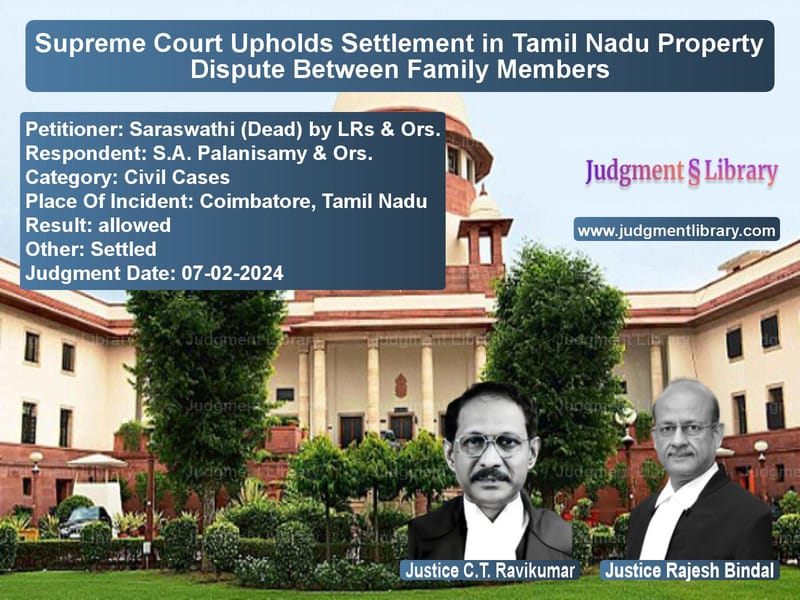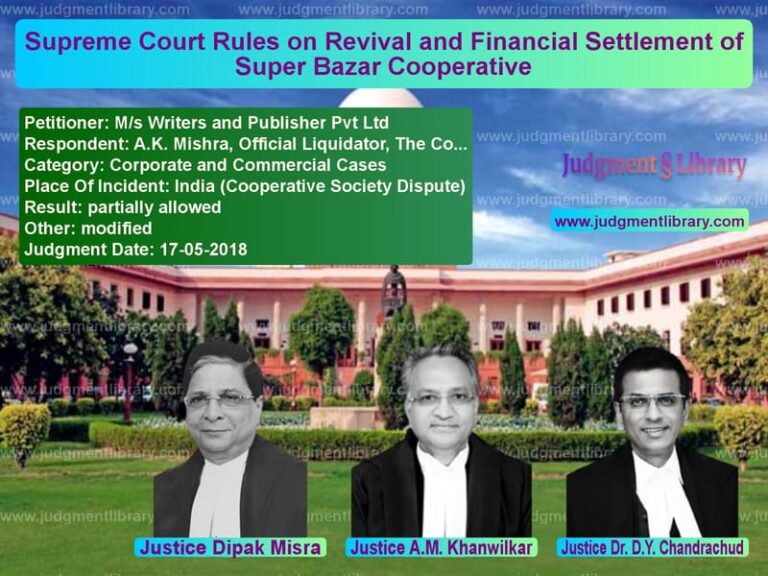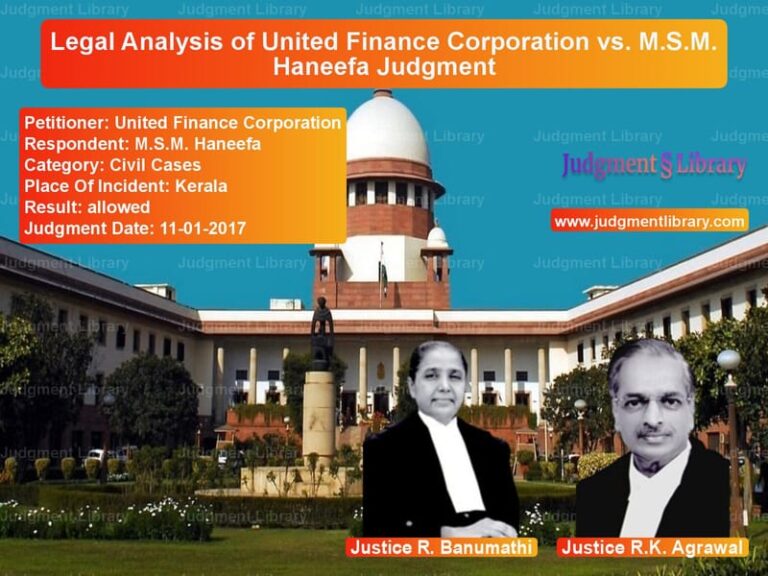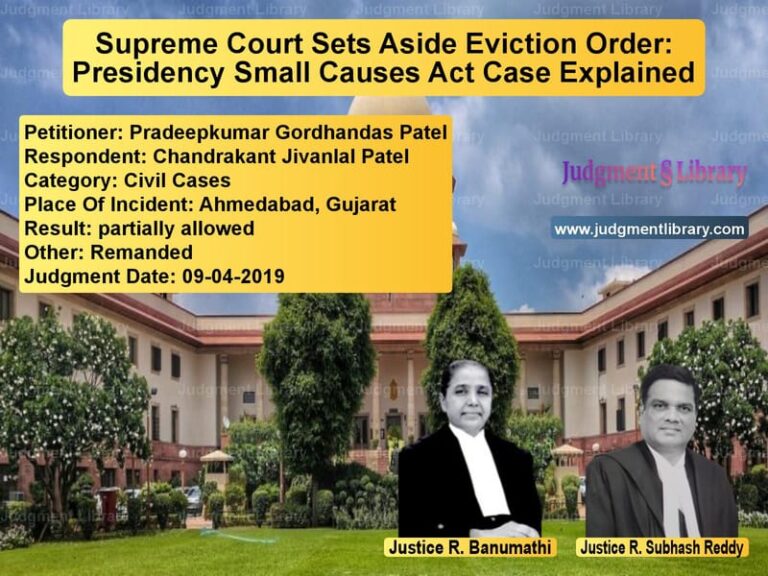Supreme Court Upholds Settlement in Tamil Nadu Property Dispute Between Family Members
The Supreme Court of India recently ruled on a long-standing property dispute between family members in Tamil Nadu. The case, which began in 1986, involved conflicting claims over property rights and was resolved after nearly four decades through an amicable settlement between the parties. The Court upheld the settlement agreement and dismissed the appeals, bringing closure to a long-running legal battle.
Background of the Case
The case originated from a property dispute between Saraswathi (since deceased, represented by her legal heirs) and S.A. Palanisamy, along with other respondents. The dispute was initially filed as a civil suit (O.S. No. 22/1986) before the II Additional Sub Court in Coimbatore.
After extensive litigation, the trial court ruled in favor of the appellants. However, the respondents appealed against this decision in the High Court of Judicature at Madras (AS No. 1397/1994). In 2008, the High Court set aside the trial court’s judgment and ruled in favor of the respondents.
Aggrieved by the High Court’s decision, the appellants approached the Supreme Court in Civil Appeal No. 5184/2011. While the appeal was pending, the parties decided to settle the matter amicably, leading to the filing of a settlement agreement before the Court.
Settlement Agreement and Supreme Court’s Decision
During the hearing, the parties presented a settlement agreement dated October 5, 2023, which outlined the terms agreed upon by all involved. This agreement was submitted along with affidavits in I.A. No. 216386/2023.
The Supreme Court took note of the settlement and confirmed that all parties had willingly signed the agreement before the trial court, following a directive from the Supreme Court issued on November 29, 2023. The Court also acknowledged that financial obligations under the agreement had already been fulfilled.
The key provision of the settlement required the appellants to submit a “No Objection Certificate” (NOC) under Clause 6 of the agreement. Although the original deadline for submitting this certificate had expired, the respondents, on instruction, agreed to extend the deadline by two months from the date of the Supreme Court’s judgment.
Considering the amicable resolution of the dispute, the Supreme Court ruled:
“Since the parties are close relatives and further taking note of the fact that the financial liabilities have been fulfilled in terms of the Settlement Agreement dated 15.10.2023, we are of the view that the impugned judgment and decree in AS No.1397/1994 and the judgment in O.S. No.22/1986 are liable to be set aside. Accordingly, they are set aside.”
The Court directed that the parties would now be bound by the terms and conditions outlined in the settlement agreement. It also instructed the registry to draw a decree based on the settlement.
Legal Implications of the Judgment
The ruling has several important legal implications:
- Finality to Long-Standing Property Disputes: The case, which lasted nearly four decades, highlights the importance of alternative dispute resolution (ADR) mechanisms in reducing litigation burden and promoting amicable settlements.
- Recognition of Settlement Agreements: The judgment reaffirms the Supreme Court’s willingness to uphold settlements reached between parties, provided they are voluntary and fair.
- Judicial Intervention in Facilitating Settlements: The Supreme Court played an active role in encouraging the parties to resolve their differences and provided necessary extensions to ensure compliance with the agreement.
Conclusion
The Supreme Court’s judgment in this case underscores the value of mediation and settlement in resolving long-pending civil disputes. By endorsing the agreement reached between the parties, the Court not only provided closure to the litigants but also reinforced the principle that amicable settlements should be encouraged wherever possible. This ruling serves as an important precedent for property disputes involving family members, encouraging resolution through negotiation rather than prolonged litigation.
Petitioner Name: Saraswathi (Dead) by LRs & Ors..Respondent Name: S.A. Palanisamy & Ors..Judgment By: Justice C.T. Ravikumar, Justice Rajesh Bindal.Place Of Incident: Coimbatore, Tamil Nadu.Judgment Date: 07-02-2024.
Don’t miss out on the full details! Download the complete judgment in PDF format below and gain valuable insights instantly!
Download Judgment: saraswathi-(dead)-by-vs-s.a.-palanisamy-&-or-supreme-court-of-india-judgment-dated-07-02-2024.pdf
Directly Download Judgment: Directly download this Judgment
See all petitions in Property Disputes
See all petitions in Succession and Wills
See all petitions in Landlord-Tenant Disputes
See all petitions in Specific Performance
See all petitions in Judgment by C.T. Ravikumar
See all petitions in Judgment by Rajesh Bindal
See all petitions in allowed
See all petitions in settled
See all petitions in supreme court of India judgments February 2024
See all petitions in 2024 judgments
See all posts in Civil Cases Category
See all allowed petitions in Civil Cases Category
See all Dismissed petitions in Civil Cases Category
See all partially allowed petitions in Civil Cases Category







